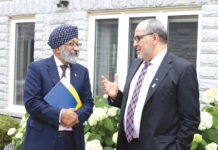Toronto-based Mukund Purohit has been awarded for promoting India-Canadian business relationship
The Canadian Bazaar
TORONTO: When Mukund Purohit landed in Canada in 2000, he struggled like most new immigrants and survived by doing odd jobs.
Sixteen years later, he has just been honoured by his birth country with the Pravasi Bharatiya Samman award for his accomplishments in Canada.
Indeed, Mukund Purohit is a rising entrepreneur with interests spanning India and Canada and across businesses such as the Neopolitan Pizza Limited chain, fertilizer production and movie-making.
“In fact, our pizza chain, started in 2012, became the first Canadian-owned company to be listed on the National Stock Exchange in Mumbai on Nov 7, 2014. We have 54 outlets as of today and we are taking it international by opening outlets in Florida, Toronto and London,’’ gushes Mukund Purohit who now splits his time between Toronto and India.
This Baroda-born man, who co-chaired the government liaison committee for Prime Minister Narendra Modi’s visit to Canada in 2015, has already had quite a few other honours under his belt – the Gauravanto Gujarati Award by the Gujarat government in 2010, the Queen Elizabeth II Diamond Jubilee Award by the government of Canada in 2012, the Canada-India Friendship Medal by the Canada-India Parliamentary Friendship Group in 2012 and the Son of Gujarat award by the Indo-Canada Chamber of Commerce..
An interview with him:
Q: Mukund Purohit, what was your feeling when your name was listed among 30 winners of this year’s Pravasi Bharatiya Samman Award in Bangalore?
It was an unbelievable feeling when the President of India gave me the Pravasi Bharatiya Samman Award for building business bridges between India and Canada. What was even more satisfying was the fact that I was the youngest NRI to receive this award so far.

Q: Tell us something about the beginning of your journey as an immigrant in Canada.
I came to Toronto from Baroda in the year 2000 and initially lived the life of a struggler as most immigrants do by doing odd jobs. But I wanted to create something of my own.
Considering my background in human resources, I set up VCare HR Solutions in 2003 to recruit manpower. We used to recruit IT people.
I quickly forged connections in the local community and formed the Gujarati Business Association in 2003. This association was to serve as a platform for my efforts to bring business leaders of India and Canada together.
Q: What was the goal behind the formation of the Gujarati Business Association?
Well, I wanted to bring small businesses of Canada and India together and I started taking delegations of small and medium businesses to India.
You know, the Tatas and the Birlas don’t need business associations to connect them with Canadian businesses. But it is the cutlery-makers or pickle-makers in small-town India who would like to sell their products in Canada but they have no connections and no one knows them in Canada. I wanted to bring small businesses in India and Canada together.
Q: You also started taking political leaders in your business delegations to India. Why?
My thinking was that business delegations come and go, they meet and exchange business cards and depart without doing any real business. I thought that business can be done only if politicians and government representatives also become part of the business delegations. That’s why we started taking political leaders with our delegations and it benefited India and my native Gujarat a lot.
Q: How did Gujarat benefit?
When as chief minister, Narendra Modi started Vibrant Gujarat in 2007, I took a delegation of business people and politicians – including Ontario MP Patrick Brown and Alberta MP Devinder Shorey – to Gujarat. Thus, Canada became the first western country to engage with Gujarat, and I am happy that I played a big role in it. This was followed by high-profile visits of Canadian Prime Minister Stephen Harper and Jason Kenney to Gujarat. Gujarat benefited from its engagement with Canadian leaders.

Q: You have expressed desire to work on skill development in Canada. Why?
Canada is my karma-bhumi. I want to give it back as much as I can. The big problem that I see in Canada is that there is a mismatch between demand and supply in the job market.
That’s why foreign investment doesn’t come into Canada because global companies know that they can get permission from the government and other requirements. But where will they get skilled manpower? That’s a big deterrence for global companies to come to Canada.
On the other hand, thousands of foreign students come to Canada, get their degrees and PR and then get stuck in small jobs because they have the degrees, but not the skills required in the market. Education is fine, but you need skills to become employable in the market.
That’s why I want to work on skill development in Canada. My idea is to start small skill development centres in Toronto so that students can take courses of very short duration – say a month or two – at a very low cost and then become employable. These centres will on the lines of ITIs (industrial training institutes) in India.
Q: Since you have been active in promoting business relations between India and Canada for years, why isn’t Canada-India trade picking up?
There are two reasons. One is the poor marketing strategy of Canadian companies in India. Two, their (Canadian) world is limited to the US, the UK and Europe. They are not much interested in India.
Q: But Canada has manifold more business with China than India. Why?
That door with China opened much earlier. It is not possible with India.

Q: Do you think the proposed free trade agreement between Canada and India will boost trade?
Yes, once the free trade agreement is signed, it will help boost trade between the two countries. In fact, lots of business people are waiting for it to be signed.
If Canada has got what India needs, I have every reason to believe that the bilateral trade will grow rapidly. Canada is rich in oil, gas, mineral resources, potash and fertilizers, and India is hungry for these these things. The Ambanis and Adanis of India will be ready for huge investment in Canada for procuring these resources.
On the other hand, fertilizer plants in India are being scaled down because of shortage of natural gas. But since Canada has abundance of natural gas, the Indian government can set up fertilizer plants in Canada and get fertilizer supplies from there.
Q: What are your hopes from the proposed visit of Prime Minister Justin Trudeau to India this year?
I want two things from the Canadian prime minister. I want Canada and India to sign the free trade agreement. The two sides have been negotiating it for years and years. The deal should be signed now.
Two, I want Trudeau to visit cities other than Delhi, Mumbai, Bangalore and Amritsar. This way, business people and traders in smaller Indian cities would also know about opportunities in Canada. There are tons of opportunities for Canada in India away from the four big cities. Look at the north-east region of India which offers huge opportunities in infrastructure for Canada.
Sadly, visiting leaders from Canada never go beyond four big Indian cities. India is not just four big cities. Canada needs to increase its visibility elsewhere in India.

Q: With your business interests in both India and Canada, how do you split your time between the two countries?
I spend half the time in India and half in Canada. Apart from looking after my businesses in India, I am also involved in charities and humanitarian causes in India.
I am actively involved in fund-raising for the Kanya Kelvani Yojana which works for literacy among young girls from poor sections of society in Gujarat. When Narendra Modi launched it, I was part of a 16-member delegation of Canadian Friends of India-Canada Parliamentary Association which presented him a cheque for $21,000 for Kanya Kelvani Yojana.
Since 2013, I have also been involved with My Home India which is an NGO that works to find missing children and restore them to their parents. We raise funds for My Home India. Since 2013, we have restored 1,400 missing children to their parents.
In Canada, I am and have been an office-bearer of organizations such as the Indo-Canada Chamber of Commerce, Panorama India and the Canada-India Foundation. I have also served as an advisor to the New Brunswick government and the economic ministry of Saskatchewan.








